Whether you’re a wide-eyed freshman or a hardened senior, the school year has a way of sneaking up on all of us. One second you’re flipping through course syllabi, and the next you’re elbow-deep in messy notes as you prepare for final exams. Luckily, it’s never too late (or early) to learn the time-tested strategies for surviving the semester with your sanity intact.
We scoured the web (and our own experiences) for the best tactics, tools, and resources to help you excel in your coursework while still seeing your friends, taking care of yourself, and making time for reflection and inspiration. These are the things we wish we had known about when we were in school! Like how to learn anything with the Feynman Technique or the best way to track and audit your productivity with software like Rescue Time. Or simply how to pick ourselves back up in the midst of failure.
You won’t find expensive high-tech gadgets like solar powered backpacks or $400 noise cancelling headphones on this list. Why? Those things—while nice—aren’t essential to your success. On the other hand, learning how (and why) to get a full night’s sleep and specific memory techniques to help you retain information will be invaluable, in school and in life.
Reading through this article will likely become yet another task on your never-ending to-do list, so don’t worry about getting through it all at once: bookmark, skim, and come back regularly.
Proven study techniques for acing exams (and, you know, actually learning something)
The Cornell Note-taking Method (method): Created by Walter Pauk, this method focuses on creating lecture notes with studying in mind. This interesting method has you divide your page into three distinct sections: “cues,” “notes,” and “summary.” It forces you to distill down concepts to their essence and truly think about what you’re writing rather than scribbling mindlessly.
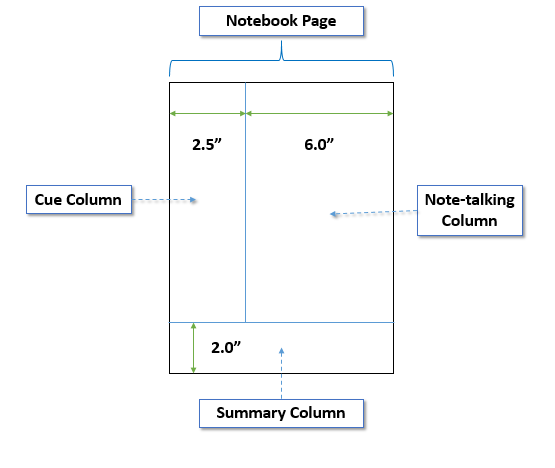 Source: University of Connecticut
Source: University of Connecticut
Anki [Windows, Mac, Linux, iOS, Android] (app): One of the best tools you can use to apply spaced repetition techniques are cue cards! Anki are digital cue cards made easy. Use them for learning new languages, committing new names and faces to memory, or memorizing complex terms. Anki syncs across devices and let you add pictures, audio, and video to your cards.
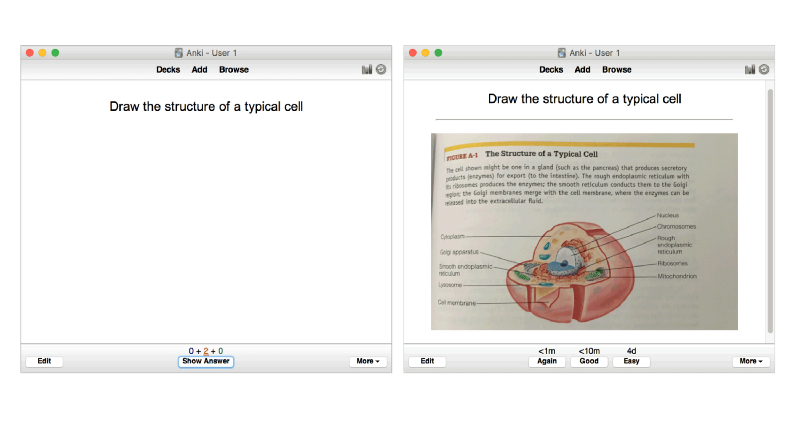
Memory Palace/Method of Loci (method): We’ll be real with you: many courses and exams will require you to memorize a vast amount of information in a short amount of time. One of the top memorization methods is the “Memory Palace” or “Method of Loci.” It involves envisioning a physical space and attaching need-to-know terms and concepts to various nooks and crannies within the room. It sounds weird, but it works!
 Source: ArtofMemory.com
Source: ArtofMemory.com
Learning How to Learn: Powerful Mental Tools to Help You Master Tough Subjects (online course): Learning how to learn is probably one of the best time investments you can make. This free online course taught by Dr. Barbara Oakley has been taken by thousands of people across the world and is fully translated in Portuguese, Spanish, and Chinese. We’ll be honest — this course will take approximately 12 hours to complete. However, these lessons will carry you from year to year and well beyond your time in post-secondary.
 Source: Coursera — Learning How to Learn
Source: Coursera — Learning How to Learn
Study Less Study Smart (video): Can studying less be a more effective means of retaining information? In a 60 minute lecture covering a study technique called “study less, study smart,” Marty Lobdell debunks the myths surrounding cramming and suggests tactics that will help students prepare for exams without stressing out. Watch to dive into the importance of rewards systems and study groups.
Feynman Technique (method): Inspired by Richard Feynman, a nobel-prize winning physicist known for explaining complex concepts with stunning clarity, this technique is simple but powerful: study a topic, write or speak about it like you’re teaching it to someone else, recognize the gaps in your understanding, and return to studying. Repeat as necessary while making your explanation simpler and simpler. This no-BS technique ensures you’re never tricking yourself into thinking you comprehend a topic you clearly don’t.
If You Want to Do Better in School, Ask for Help (article): Not knowing something can fill us with imposter syndrome, and worse yet, keep us from seeking the advice that we need. This article examines why top students are more likely to attend office hours and gives advice on getting over our fear of feeling stupid so we can fast-track our learning and improve our performance.
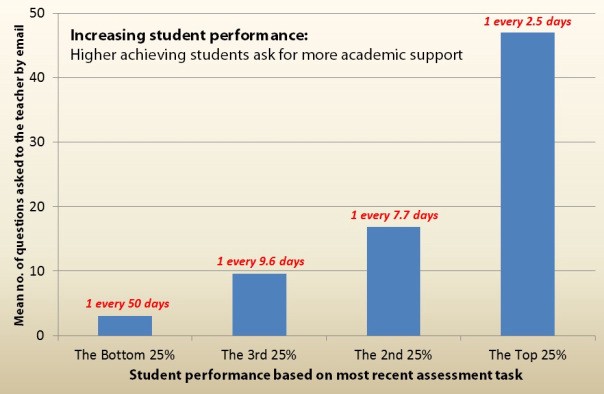 Source: Lifehacker
Source: Lifehacker
Stuff You Should Know: How Memory Works (podcast episode): Why can we remember broken down segments like phone numbers? How can we harness emotional memory? Josh and Chuck, the hosts of Stuff You Should Know, dive into the science of memory, why something things stick and others don’t, and why distraction is kryptonite for forming memories.
How to Remember What You Read (article): If you’re aiming for retention and understanding while you read, passive reading just isn’t your best bet. This article encourages readers to throw away the concept of reading a book from start to finish and instead suggests methods like going through the index and gaining context on the author before you even get started. It’s also chock-full of excellent advice on effective note-taking.
62 Tips on Crushing Public Speaking (article) : It’s inevitable: you will have to stand in front of a classroom and give a talk at least once. These tidbits of advice on delivering a great presentation will help you calm your nerves, prepare a slide show that’s interesting, and leave your audience feeling informed and engaged. One great takeaway: don’t spend more than 60 seconds on a slide!
Online study groups to keep yourself accountable
Study Together (Discord community): The pandemic has meant a move to online education, Zoom school, and even internet-based student communities. Study Together, a Discord server with nearly 200,000 students across the world, is a digital meeting space where you can trade test tips, share resources, and find study buddies. Join other students in live rooms where you can study screen-to-screen or webcam-to-webcam to stay motivated and simulate the feeling of being in the library. You can also build a study streak, join monthly study challenges, or hop into music rooms to listen to lo-fi or classical music while you work.
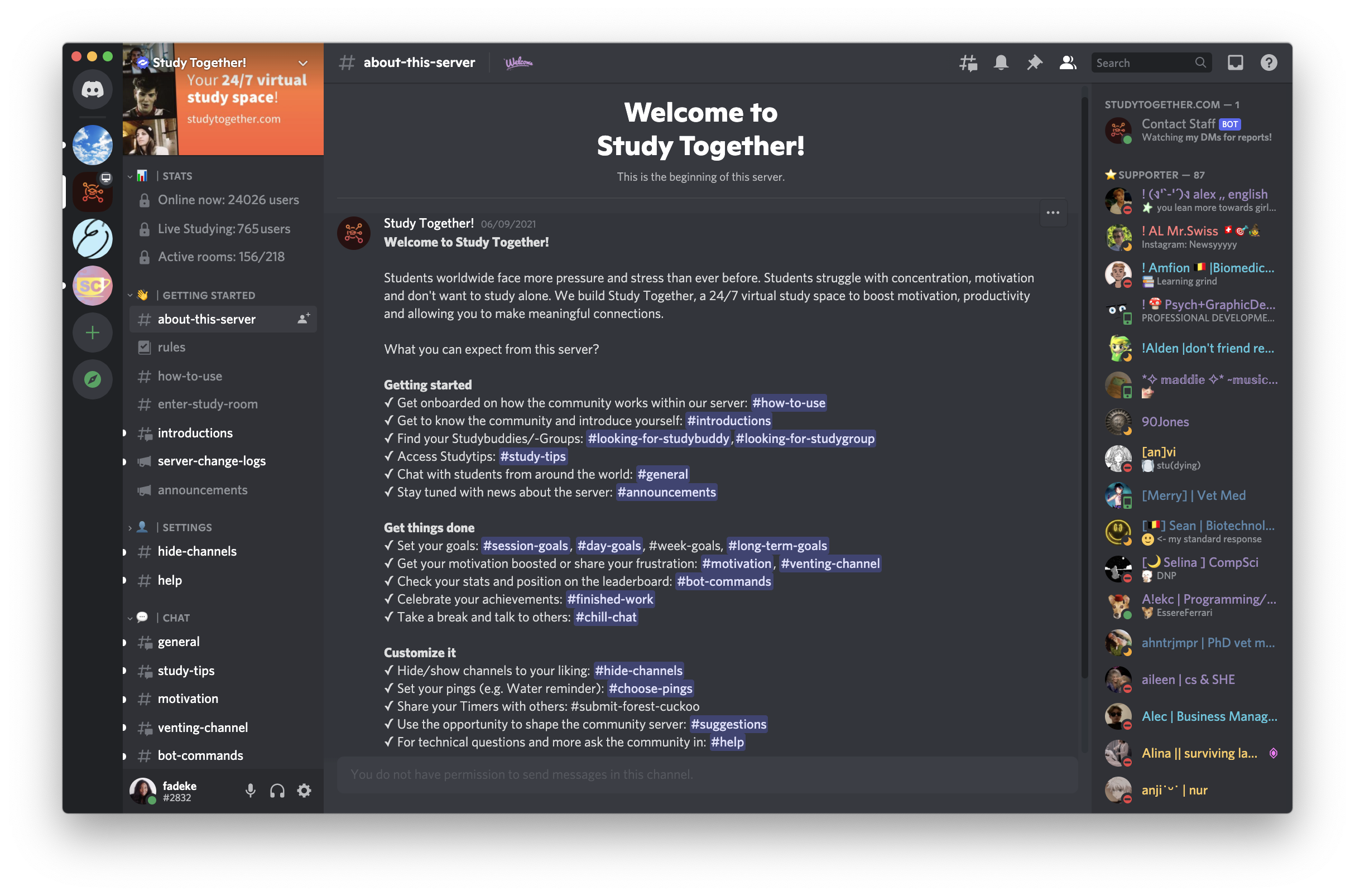
Study Stream (online study groups): Early morning reviews and late night study sessions can feel like a solitary exercise. Make studying feel less lonely with Study Stream, a service that lets you work alongside other students from around the world on Zoom. Find a productive community of students online while boosting your focus and sense of accountability in the process. Plus, join weekly events with students across 30 countries.
Hours (virtual study groups): Create study groups with your friends with Hours, an online space that lets you schedule a time to meet, share tasks, and create accountability. The concept of the platform is based on a blog post that defines the “hours” productivity method, where you work with an accountability buddy, set an intention for an hour, and check back in.
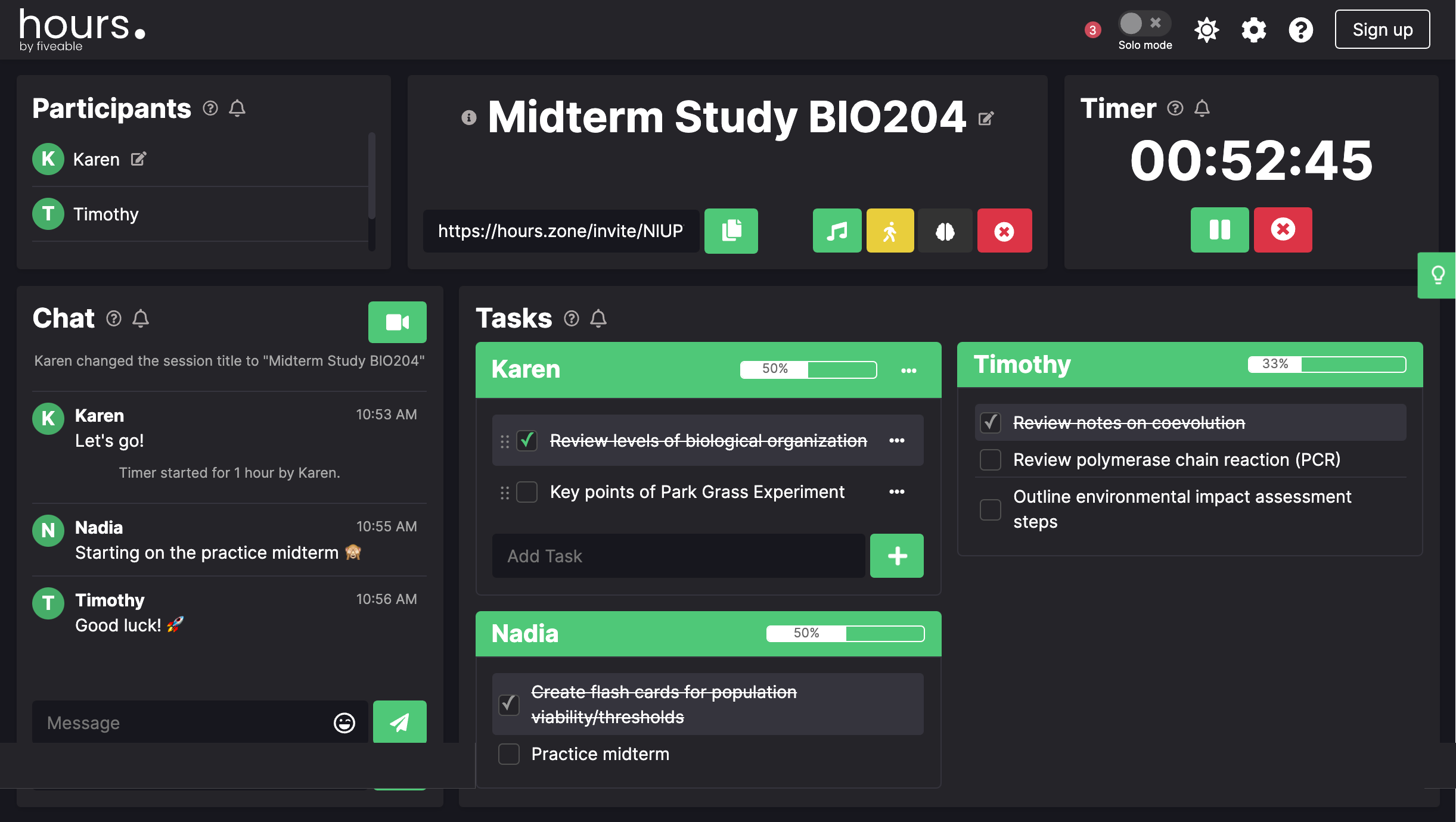
How to work smarter, not harder (so you still have time to play)
The Ultimate Guide to Personal Productivity Methods (article): Having a to-do list simply is only half of the equation. A system that creates a process for your productivity and helps you build daily habits around work is essential. There are dozens of productivity methods like time blocking, Getting Things Done, Pomodoro, or Don’t Break the Chain. This article breaks them down into various categories so you can find the method that truly works for you—whether you’re a tactile person or a visual one.
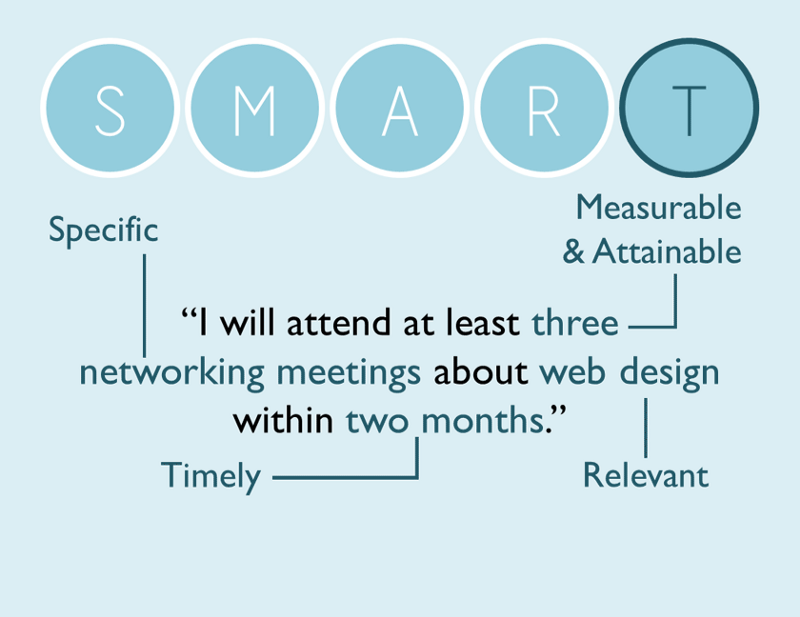 Source: Doist’s Ambition and Balance Blog
Source: Doist’s Ambition and Balance Blog
Freakonomics: How to Be More Productive (podcast episode): Listen in on a fascinating conversation about productivity with Charles Duhigg, the author of The Power of Habit and Smarter Faster Better: The Secrets of Being Productive in Life and Business. He explores eight key areas of productivity that include everything from goal setting and decision making to innovation and absorbing data.
Todoist [Web, iOS, Android, Windows] (app): We’re biased of course, but a digital task manager that you can access across your devices is essential for juggling all your responsibilities. If you’re looking to get organized for the semester and plan your days, weeks, and months to a T, Todoist will help! Create projects for all your specific courses, add important assignments to your task list, and schedule in activities to keep you balanced — like time with friends and exercise. We also have created A Student’s Guide to Todoist that’s the perfect companion piece for getting the most out of Todoist in your upcoming semester.
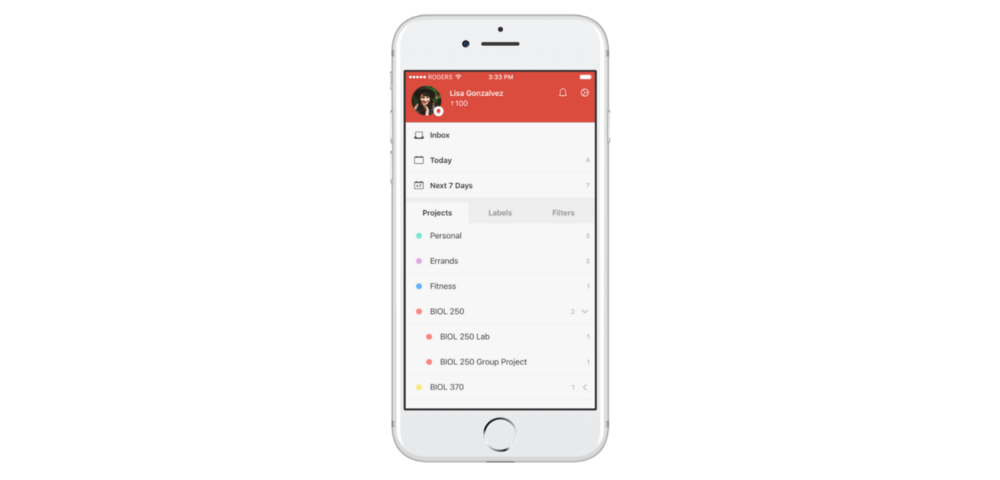 Source: Doist’s Ambition and Balance Blog
Source: Doist’s Ambition and Balance Blog
Beating procrastination, minimizing distractions, and improving focus
Rescue Time (app): The first step to managing your time effectively is knowing where your time goes in the first place. Rescue Time tracks all of your activity on your desktop device and sorts them into “productive,” “distracting,” and “neutral.” You can set goals like limiting time on distracting categories like social media or online shopping!
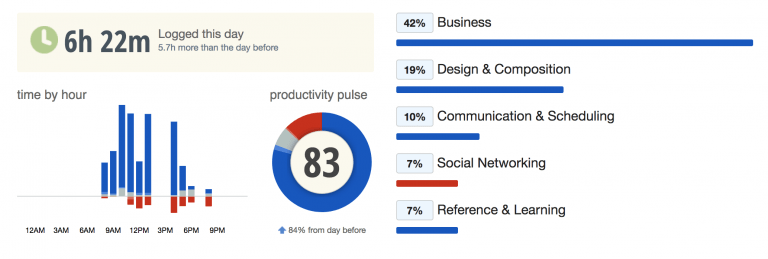 Source: Rescue Time Blog
Source: Rescue Time Blog
Shift (app) : If you’re running a variety of software on your computer — whether collaboration and communication tools for group projects or file sharing and storage apps to keep your class notes straight—Shift lets you access all your favorite apps from a single location. Fewer open tabs, more focus!
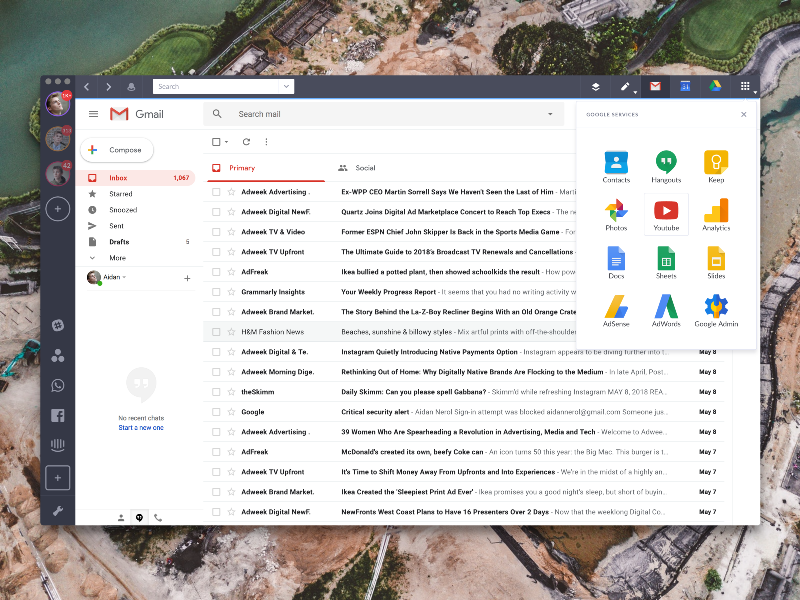 Source: Shift Website
Source: Shift Website
Streaks [iOS] (app): Don’t let school and study make you stray from positive and healthy habits. Download Streaks, a mobile habits tracker, that lets you log everything from practicing guitar to reading a book or calling a loved one to going for a walk.
Beyond Time Management: Why We Really Procrastinate and How to Finally Stop (article) : Studies show that one of the reasons we procrastinate is because our brains aren’t wired to prioritize the activities that will benefit our future selves. Luckily, we can hack our brains to overcome procrastination. This article provides seven sound strategies for getting started including asking for help and counterintuitively, letting yourself avoid uncomfortable tasks.
Micro-Progress and the Magic of Just Getting Started (article): Challenge yourself to let go of an “all-or-nothing” attitude in favor of taking tiny steps towards smaller wins…micro goals! This concept is particularly valuable for projects that can span an entire semester. Rather than “writing a paper,” get started by simply “brainstorming a topic for 10 minutes.”
For any task you have to complete, break it down into the smallest possible units of progress and attack them one at a time.
Freedom [Mac, Windows, iOS], SelfControl [Mac] (apps): Sometimes willpower simply isn’t enough. If distracting sites are eating away at your time, use a site blocker to remove the temptation of scrolling through Instagram or checking Reddit.
 Source: Freedom Website
Source: Freedom Website
Brain.fm, Noisli, Focus@Will (apps) : The science is out on whether binaural beats, isochronic tones, and sounds in general have an impact on our ability to focus. However, a lot of people appear to benefit from these sounds to help them slip into focus mode! Give them a try to see if they make an impact on your attention span.
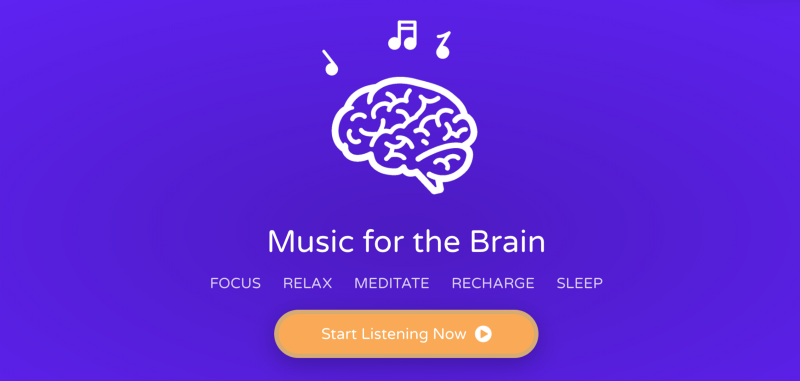 Source: Brain.fm Website
Source: Brain.fm Website
Understanding motivation and the right mindset for success
Motivation: The Scientific Guide on How to Get and Stay Motivated (article): If the call to watch one more episode on Netflix is stronger than your desire to study, exploring the science of motivation will help. James Clear provides a number of concrete takeaways like how to get motivated and the process of automating motivation through scheduling.
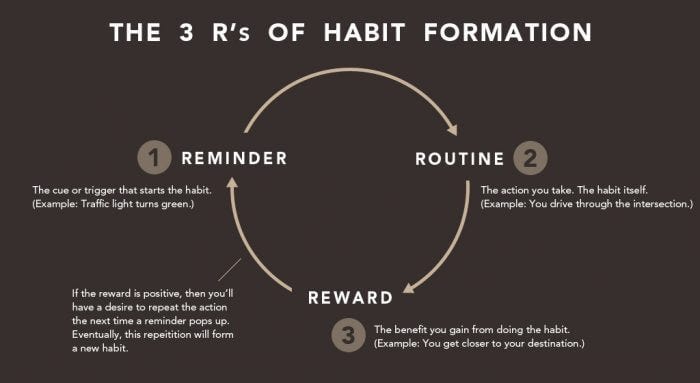 Source: James Clear Website
Source: James Clear Website
How to Win at College: Surprising Secrets for Success from the Country’s Top Students by Cal Newport (book): Cal Newport, a computer science professor at Georgetown University, tracked down and interviewed top students across the country looking for those who embodied what he defines as “multifaceted success.” You might appreciate one of his more controversial pieces of advice: don’t do all your reading. Bonus: for quicker reads, check out his popular blog for advice on productivity and doing your best work.
“For an ambitious college student, Sunday is the most important day of the week. Even though it’s tempting on a Sunday morning to just curl up on your couch and become intimately reacquainted with your old friend the TV, you really must resist. Why? Because Sunday sets the tone for the week that follows.”
How to Craft the Perfect Daily Schedule (article): Doist developer Wilian Molinari distills the scientific research behind perfect timing into an actionable guide to Give it priority on your reading list so you can apply concepts like never making important decisions in the afternoon and being mindful of your circadian rhythm. (Yes, this means opting out of all-nighters!)
Other essential apps for learning, studying, and getting things done
WolframAlpha [Web, iOS, Android] (app): This app is quite controversial — students find it invaluable for learning complex math sets, while professors have observed it used by their students for cheating. One thing is for sure — WolframAlpha is an incredibly powerful tool to learn step-by-step solutions for mathematics and a host of other subjects. It goes without saying: use it for studying, not beating the system!
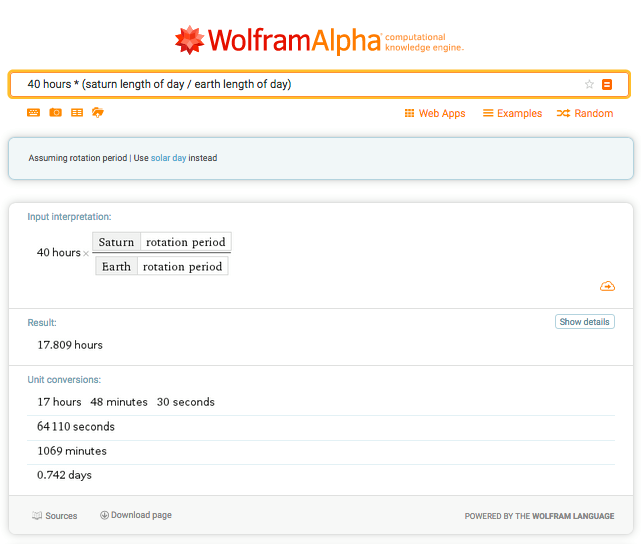 Source: WolframAlpha Facebook
Source: WolframAlpha Facebook
Socratic [iOS, Android] (app): This app is like having an on-demand tutor in your pocket. It helps students work through problems on a variety of disciplines including math, chemistry, English, and history. Socratic boasts over 100,000,000 questions solved — yours might be among them!
G Suite (apps): Whether you’re adding exam and assignment dates to a calendar, creating digital notes, or collaborating on group projects, G Suite is an optimal solution for students on the go. Collaborate on presentations with Google Slides, store files on Google Drive, schedule meetings with Google Calendar, and so much more. G Suite is ubiquitous in the work world, so you’ll benefit from familiarizing yourself with it while you’re in school.
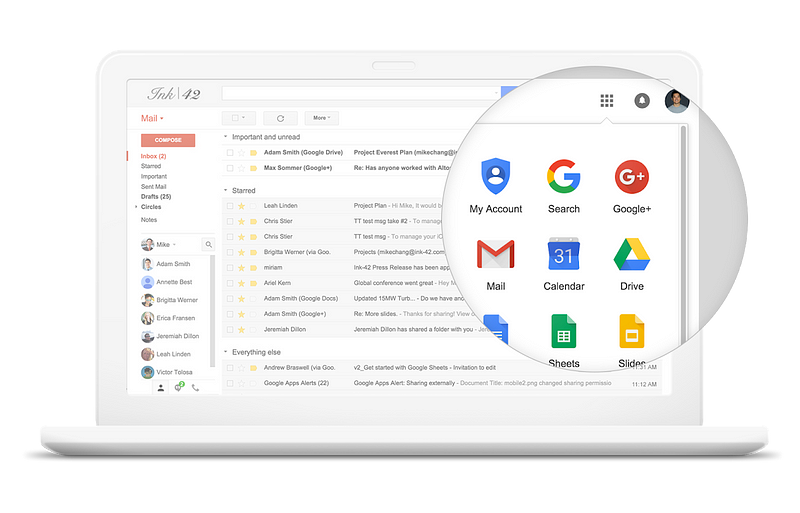 Source: Google Cloud Website
Source: Google Cloud Website
Tiny Scanner (iOS, Android), Scannable (iOS): Skip the library’s scanner queue, and save time by scanning important documents directly on your phone. Scanner apps let you use your mobile device to create scans of documents, photos, and receipts and turns them into .pdf files you can save, email to yourself yourself, or print.
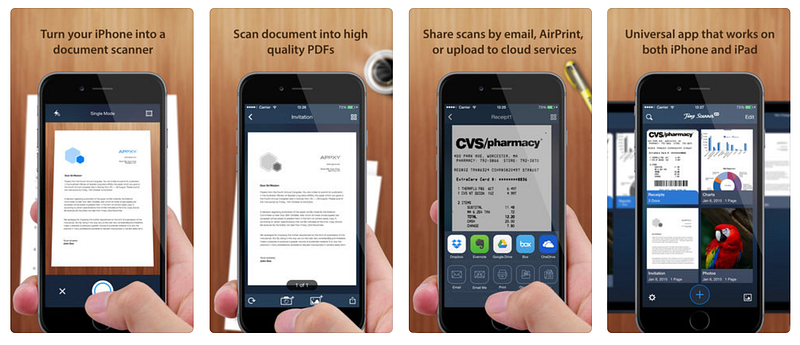 Source: Tiny Scanner Apple App Page
Source: Tiny Scanner Apple App Page
EasyBib (website): Keeping your references straight while you write research papers saves you the headache of going back and collecting your sources later. EasyBib helps you save references for research papers, books, and online sources and automatically sorts them into a bibliography in the style guide of your choice: APA, MLA, Chicago, etc.
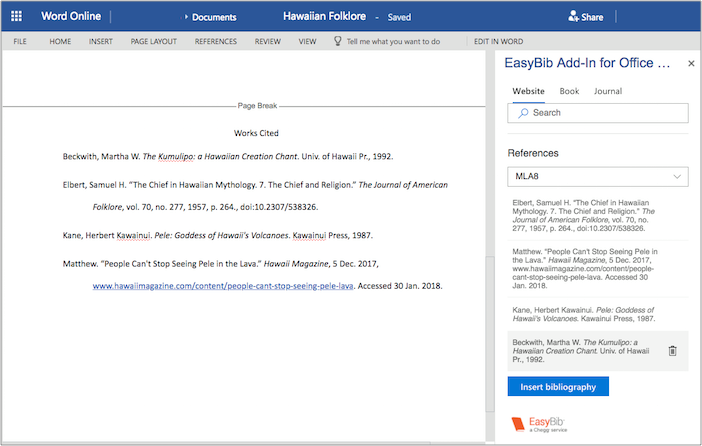 Source: EasyBib Facebook Page
Source: EasyBib Facebook Page
Khan Academy (free online courses) : If you need clarification on a complex concept or miss a lecture, Khan Academy is a brilliant resource. It has a wide range of video lectures for students learning concepts in math, science and engineering computing, arts & humanities, and economics and finance. There’s also helpful test prep resources for exams like the LSAT, MCAT, and GMAT.
YNAB (web, iOS, Android) (apps) : Between textbooks and tuition and all the other expenses of college life, budgeting and keeping track of your finances is essential. YNAB (short for You Need a Budget) helps you give every dollar a job so you know exactly what you have to spend on essentials, like rent, and the fun things, like eating out. The app also helps you make progress toward your longer term savings goals, like that Spring Break trip to Costa Rica. In short, YNAB helps you spend less time and energy stressing about your finances and more time doing literally anything else. If you’re new to budgeting, here’s a handy beginner’s guide to budgeting with YNAB and learning the habits to organize your finances for good.
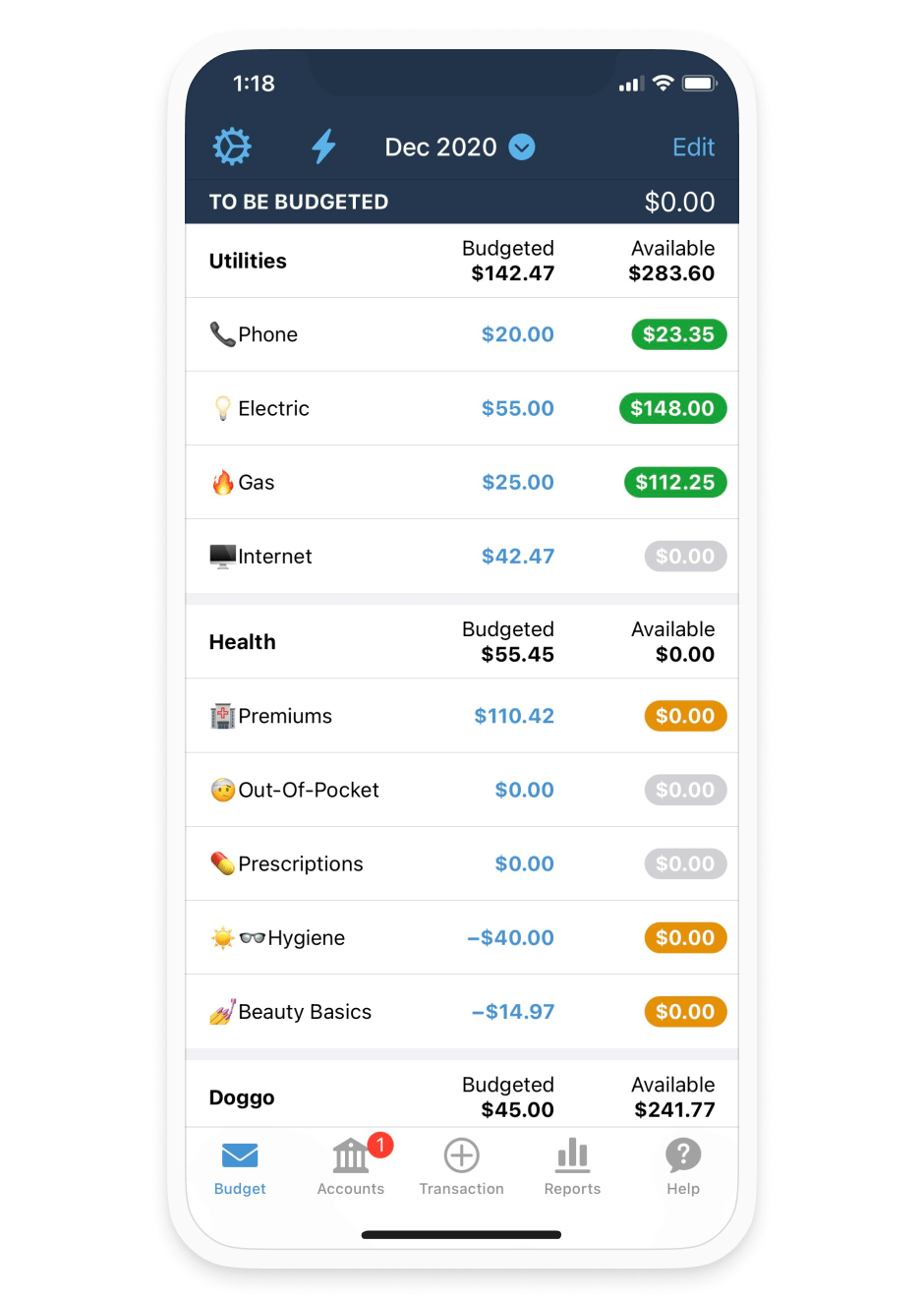
Open textbooks and academic papers
OpenStax (free open-source online textbooks): If your school is flexible about the textbooks you use for class, consider OpenStax for a range of free, peer-reviewed introductory textbooks on subjects like microeconomics, physics, biology, accounting, business law, statistics, and more.
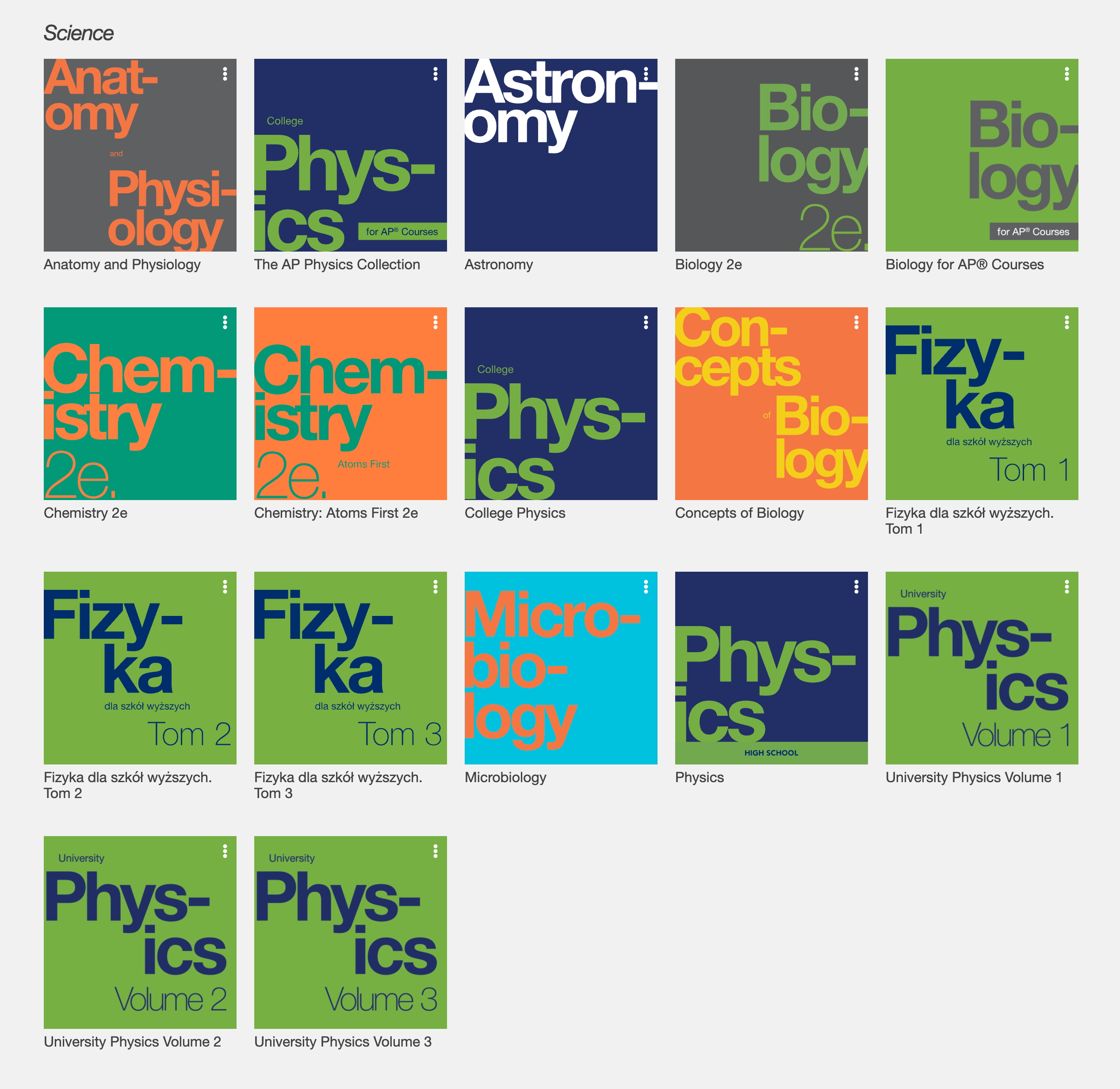
Sci-Hub (open access to academic articles): As part of your tuition, your post-secondary institution provides access to locked academic journals. However, you’ll still occasionally come across a paper that’s paywalled. Sci-Hub is a “shadow library website” that bypasses copyright to provide access to millions of research papers and books. Just be aware that publishers have been critical of Sci-Hub and it is blocked on many campuses.
Library Genesis (free access to textbooks): Similar to Sci-Hub, Library Genesis bypasses copyright to provide open access to textbooks, allowing students to save money and access paid resources. Again, be aware that publishers have been critical of Library Genesis and it is blocked on many campuses.
Improve your writing, improve your grades (not to mention your employability)
The Sense of Style: The Thinking Person’s Guide to Writing in the 21st Century by Steven Pinker (book): If you think you can scrape by on lackluster writing throughout college because you’re not an English major, think again! Writing well is one of the strongest skills you can cultivate both for post-secondary and beyond, across all disciplines. Pinker’s Sense of Style is the perfect guide for lessons like pruning needless words, how to structure a sentence, and more granular advice like when to use “shall” versus “will.”
Easy Reading Is Damn Hard Writing (article) : Writing something filled with jargon and unnecessary words that obscure your argument is easy. Writing with clarity is hard. This article synthesizes the best tips on writing with simplicity and explains how to add flow to your writing.
Prioritizing self care, stress management, and sleep
The Science of Sleep: A Brief Guide on How to Sleep Better Every Night (article) : Sleep is often the first casualty of a hectic schedule and too much to do. This comprehensive article on sleep examines why we need extended periods of sleep for brain function and what happens when sleep debt creeps into our lives.
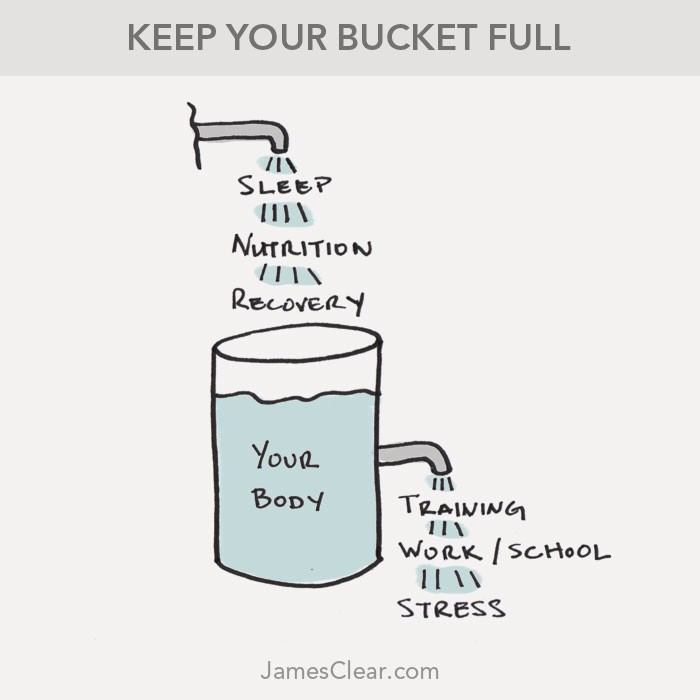 https://jamesclear.com/sleep
https://jamesclear.com/sleep
Ipnos — Relax Melodies [iOS, Android] (app) : If you’re living on campus in a noisy dorm, reside with roommates who are allergic to quiet, or simply can’t calm your mind, sleep meditations are a good option for getting to sleep quicker. The app comes with white noise sounds and meditations to sooth you into a sound slumber. It’s free and available in 11 languages.
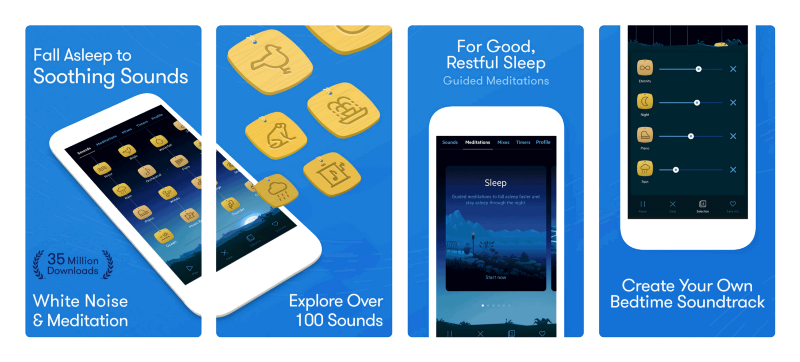 Source: Ipnos Apple App Page
Source: Ipnos Apple App Page
The Last Conversation You’ll Ever Need to Have About Eating Right (article) : Eating properly will fuel your body and help your brain carry out the functions it needs to help you excel academically. There’s just one thing…what exactly is proper nutrition? This article dives into recent food fads and cuts through the noise and misinformation on what it means to eat well. This guide focuses on consuming simple and wholesome foods while steering clear of misguided nutrition advice like “carbs are evil.”
 Source: Grubstreet Website
Source: Grubstreet Website
Headspace [iOS, Android] (app) : Meditation has been touted as a powerful method for relieving stress, improving your mood, and cultivating better habits through mindfulness. Headspace is a guided meditation app that aims to calm your mind and help you build a regular meditation practice. When assignments start piling up and exams are looming, this is a great tool to add to your arsenal.
 Source: Headspace Website
Source: Headspace Website
How to Maintain Friendships (article): College can be a time of immense personal growth. That doesn’t mean you have to go at it alone! This guide to maintaining friendships discusses the importance of having strong relationships in your life and examines how busyness and flakiness can undermine our friendships while small gestures and routine hangouts can strengthen them. Read for excellent strategies on ensuring meaningful back-and-forth exchanges while communicating.
Shinetext [SMS for U.S. Only, Facebook Messenger for International] (Free SMS subscription service, app): This free service is a daily pick-me-up! Have inspiring and customized messages sent your way on the regular to keep you feeling motivated and in a positive mood. It also provides actionable advice that will spark creativity and boost your confidence.
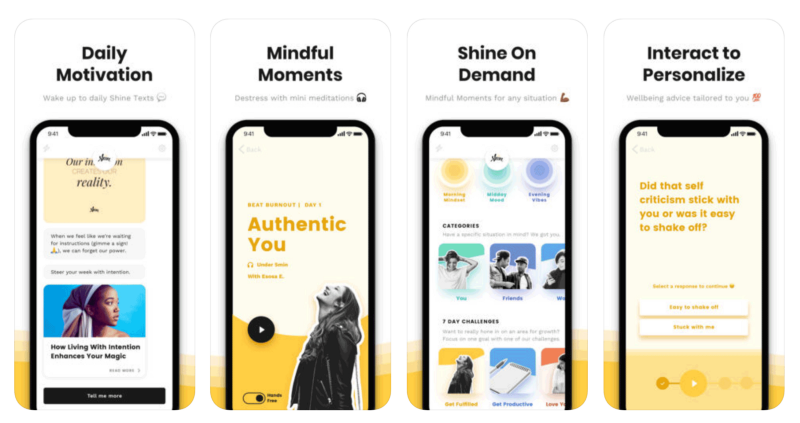 Source: Shinetext Apple App Page
Source: Shinetext Apple App Page
Aaptiv (iOS, Android) : Aaptiv has been coined the Netflix of workouts. They have a massive library of audio workouts that range from running, stair climbing, and weightlifting! If you like the feeling of an instructor or a personal trainer in your ear, this app is great go-to for keeping your workouts both fun and challenging. Subscriptions are 50% off for students!
The best advice on landing internships and mastering the job search
Advice for Students and Recent Graduates on Finding Jobs — Liz Wessel of WayUp (video): In a competitive internship and job market, it’s important to stand out from other candidates. Liz Wessel, the founder of WayUp, share her advice on the power of cold emails and the right amount of research for a job interview during this insightful conversation. Bonus: Wayup (website) is a platform that connects students and new grads with internships and jobs at some of the top companies in the world!
How You Can Land a 6-figure Job In Tech With No Connections (article) : While you may not want to work in tech (or even make six figures!), this article is an alternative approach to landing a job that you’ve probably never heard of before. The vast majority of job openings are not posted online, they pass through closed networks and referrals. When jobs are posted, you’re competing against hundreds (even thousands) of other applicants. In these cases, sometimes getting noticed just comes down to who has the resume best optimized for an applicant tracking system. This approach emphasizes taking an incredibly active approach to finding a role rather than passively submitting resumes.
Things school won’t (always) teach you about life, career, and failure
80,000 Hours (website) : At an estimated 40 hours a week, 50 weeks a year, for 40 years, you’ll spend over 80,000 hours of your life working. The team behind 80,000 hours wants students and new graduates to make the most of this mind-boggling amount of time. Their resources force you to think about intriguing questions like “which job can help the most people?” or “what makes for a dream job?” We recommend the full guide, but the condensed YouTube series is excellent too.
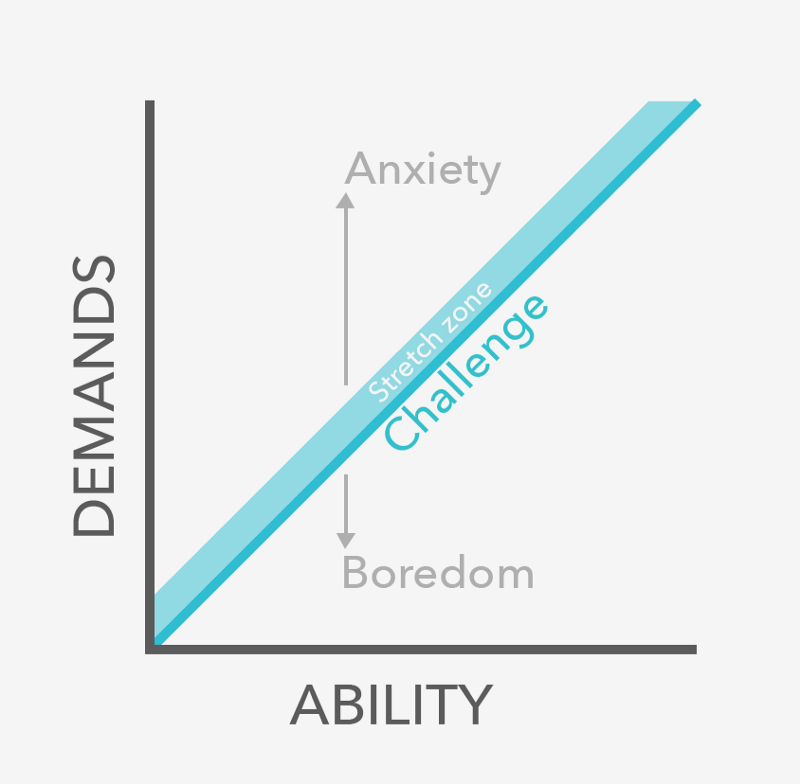 Source: 80,0000 Hours Website
Source: 80,0000 Hours Website
How to Do What You Love (article) : Paul Graham’s essay dives into myths we’re told about careers while growing up that go on to shape our adult perspective. He argues that when considering a profession, it’s more important to ask ourselves not how to make money, but rather, what to work on. A few important takeaways for finding a career you love: don’t worry about what others think and don’t seek out prestige.
It’s also wise, early on, to seek jobs that let you do many different things, so you can learn faster what various kinds of work are like.
A Working Framework for How to Design the Life You Want (presentation): Mille Tran, the Global Growth Editor at The New York Times, put together a slide presentation on how to think about your career that’s a far cry from the usual perspective. Rather than viewing careers as ladders, she shows they can be non-linear. Instead of thinking about titles you earn, think of the skills you develop and the experiences you cultivate. It’s a refreshing take on careers that will have you nodding your head if you’ve ever wondered what a “meaningful career” looks like for you.
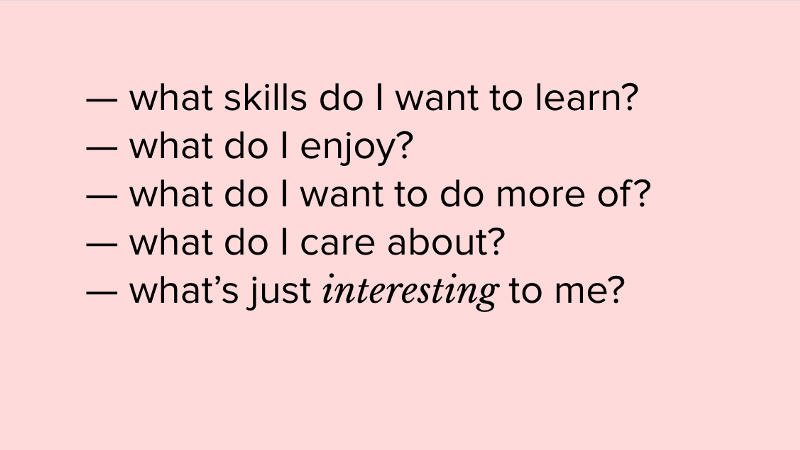 Source: Mille Tran Presentation
Source: Mille Tran Presentation
When You’re at the Crossroads of Should and Must (article) : Sometimes the pull of what you “should” do (based on societal expectations and people’s voices in your ear) and what you “must” do (what you truly want) can be exhausting. Ella Luna explore the dichotomy in a must-read for students and professionals alike who feel they’re at at an impasse.
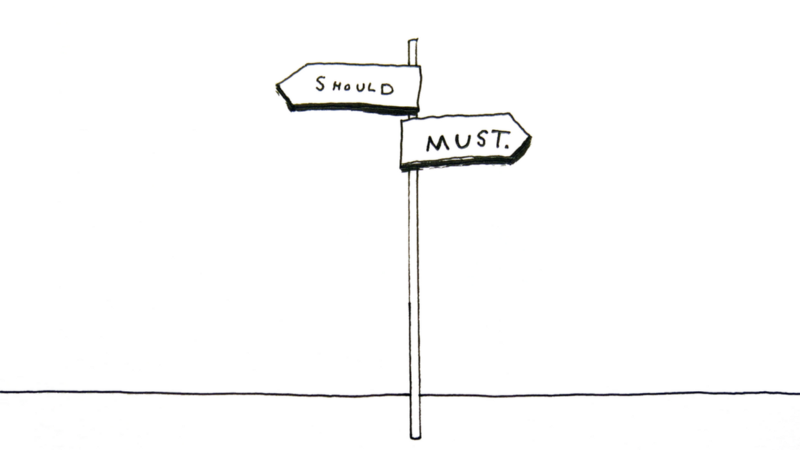 Source: First Round Review
Source: First Round Review
Steve Jobs’ 2005 Stanford Commencement Address (video/transcript): You may have heard the iconic phrase, “Stay hungry. Stay foolish.” It comes at the very end of Steve Jobs’ inspiring commencement speech divided into three sections: connecting the dots, love and loss, and death. Watch for advice on charting a worthwhile life and career while maintaining a regret-free existence.
Cal Newport: “Follow Your Passion” Is Bad Advice (video): Throughout this thought-provoking talk, Newport explores a crucial question: “How do people end up loving what they do for a living?” Rather than suggesting that people should follow their passions, he maintains that building mastery of a skill is what causes passion to blossom. It’s contrarian advice you need to hear for yourself.
Better Than Before: Mastering the Habits of Our Everyday Lives by Gretchen Rubin (book) — Rubin puts forth that “habits are the invisible architecture of daily life.” Throughout her book, she encourages readers to cultivate self-knowledge in order to truly build habits that lead to better lives. Read to find which you fall into among her “Four Tendencies Framework”: upholders, questioners, obligers, or rebels.
Designing Your Life by Bill Burnett and Dave Evans (book): Designing Your Life was originally an incredibly popular course at Stanford University that taught students how to apply design thinking to designing life after post-secondary. Burnett and Evans synthesized their course into this book that’s filled with actionable advice and a variety of exercises to build the career you want. If you’re struggling with deciding between three different career paths or a few different internship opportunities, their solution is powerful: find a way to try out (or “prototype”) every single one of them.
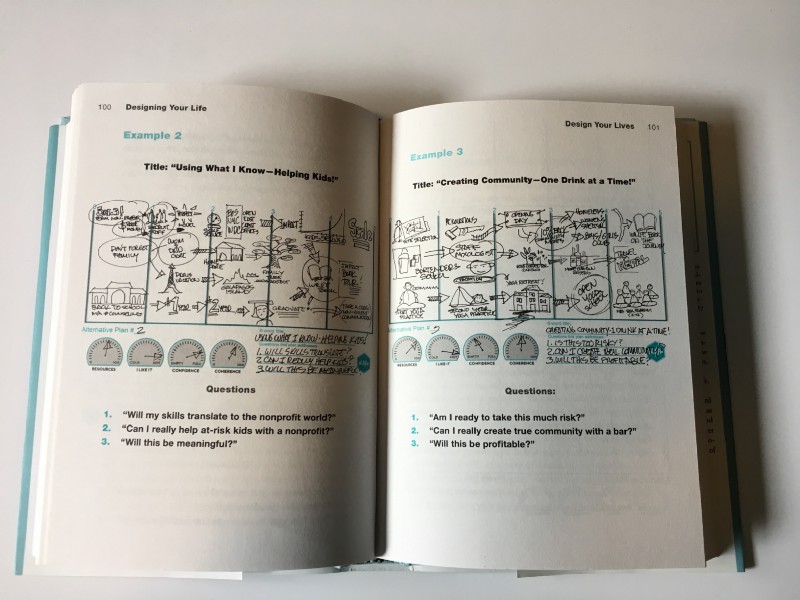 Source: Designing Your Life by Bill Burnett and Dave Evans
Source: Designing Your Life by Bill Burnett and Dave Evans
How to Pick a Career (That Actually Fits You) (article) : This is less of an article and more of a 15,000+ word deep dive into choosing a career that satisfies the criteria that’s important to you. Tim Urban’s exploration of careers makes us ask ourselves important questions like “Why is this something I want?” or “What are the important things in life?” to gain a better understanding of what profession will keep us happy in the long-run.
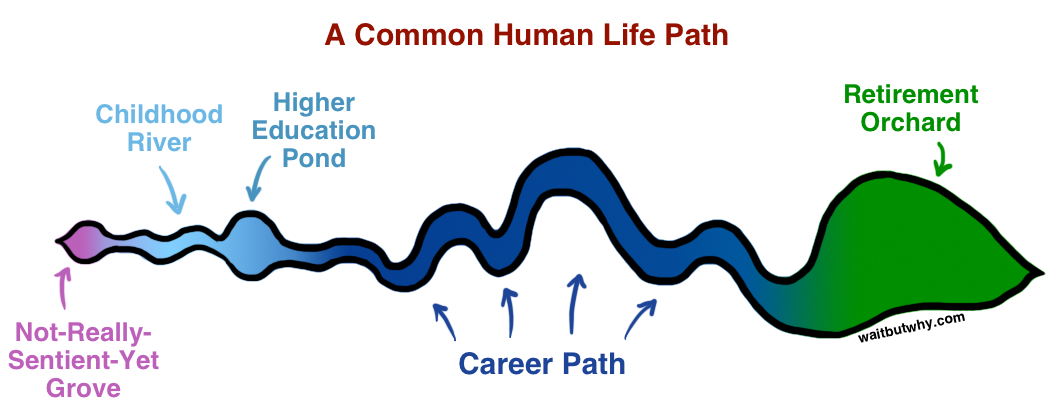 Source: Wait But Why Website
Source: Wait But Why Website
Offline resources to seek out on campus
Librarians: If you’re working on a research paper, schedule a meeting with a librarian at your school’s library. They’re highly skilled and well equipped to help you locate obscure sources, teach you to use your school’s online academic research portals, and generally provide excellent advice on conducting high quality research.
 Photo by Darwin Vegher on Unsplash
Photo by Darwin Vegher on Unsplash
Mental health services: Please take advantage of your school’s mental health services if you get even the slightest inkling that you might need them. Whether you’re struggling with anxiety or depression, or simply need to vent, school is a much more challenging experience without help. Often these services are free, included in your tuition, or may be heavily subsidized.
 Photo by Nik Shuliahin on Unsplash
Photo by Nik Shuliahin on Unsplash
Campus food banks: If you’re running low on funds and having trouble making ends meet, visit your campus food bank or food pantry. These are typically judgement free zones where you can feel comfortable taking what you need.
 Photo by Aldyth Moyla on Unsplash
Photo by Aldyth Moyla on Unsplash
Career services : Your campus likely has a career or placement office you can take advantage of to learn how to create better resumes, academic CVs, letters of intent, and cover letters. They may also put on events like rapid resume reviews or host professionals who speak on their careers and they steps they took to get where they are.
 Photo by Cytonn Photography on Unsplash
Photo by Cytonn Photography on Unsplash
Networking events: Get out there and meet people! Whether it’s coming face to face with your fellow students, prospective employers, or people from your industry of choice, you’ll never regret making a new connection or having a fruitful conversation.
 Photo by rawpixel on Unsplash
Photo by rawpixel on Unsplash
If you have any great resources that have helped you as a student or new graduate, we would love to hear about them! Tweet us @todoist.
The post 60+ Resources for Students Who Want to Stay Productive appeared first on Ambition & Balance.

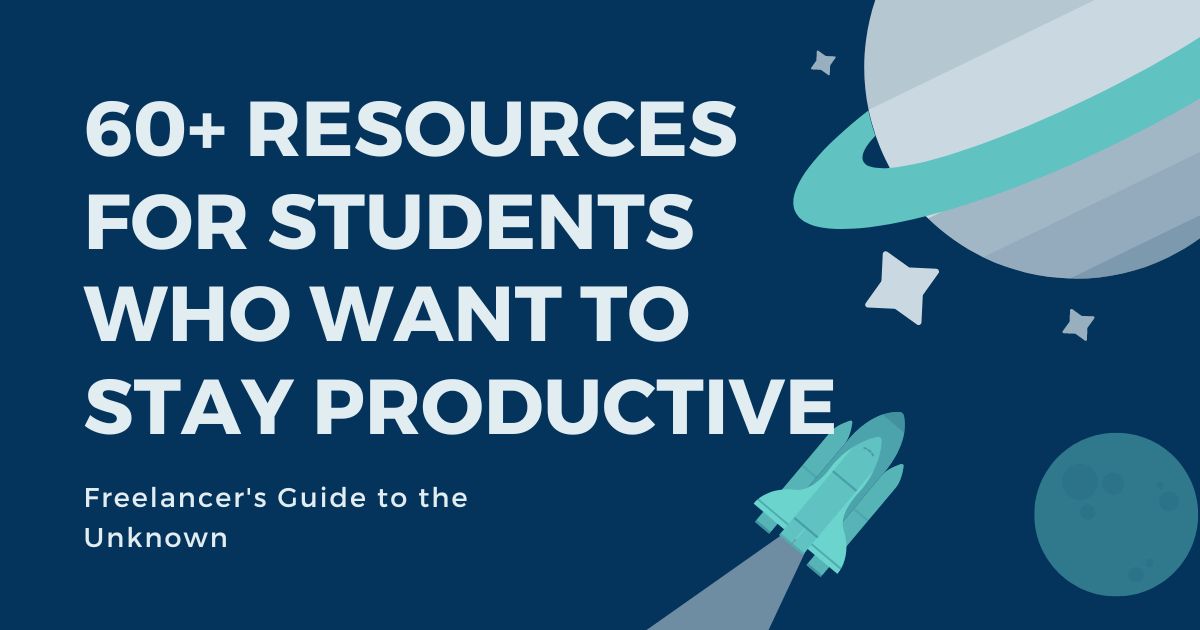
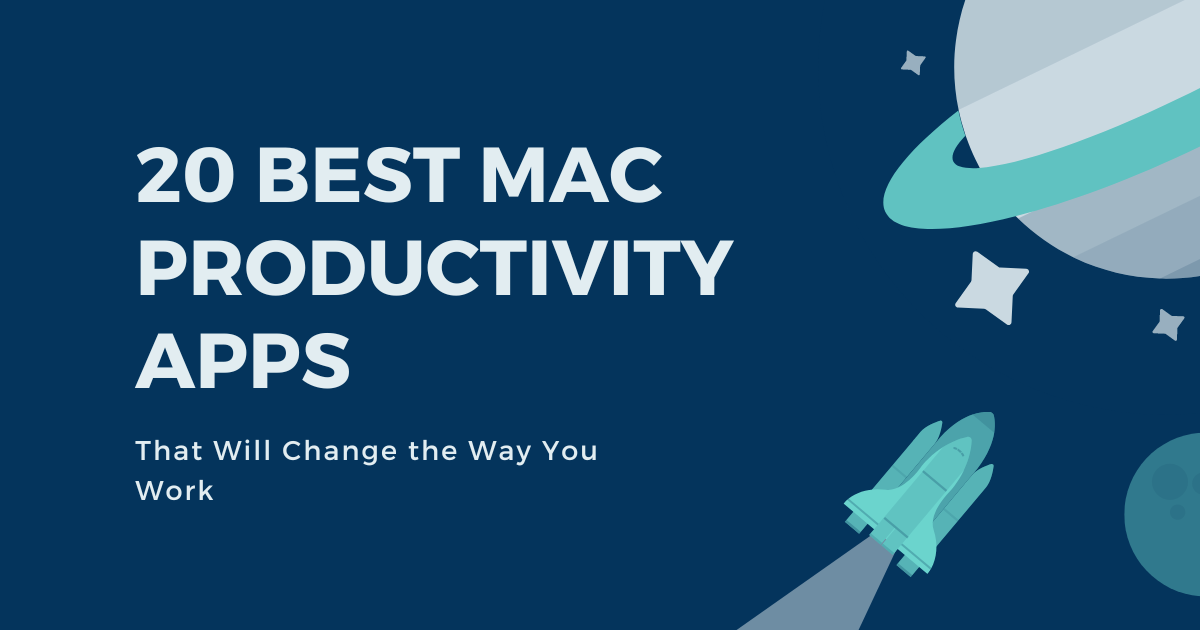
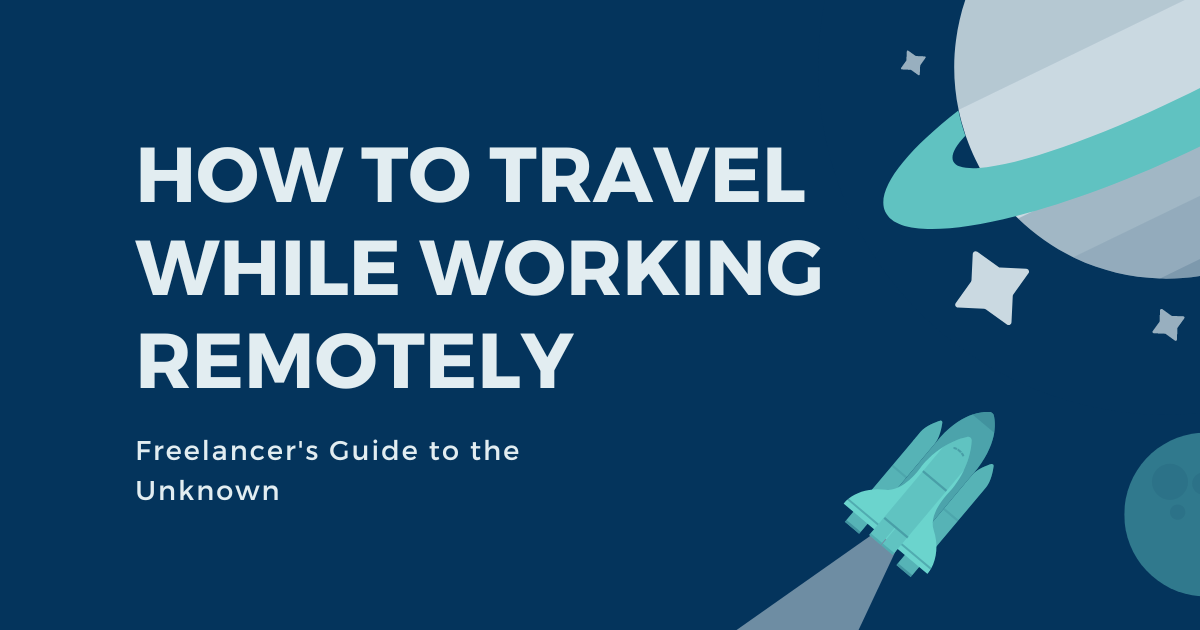

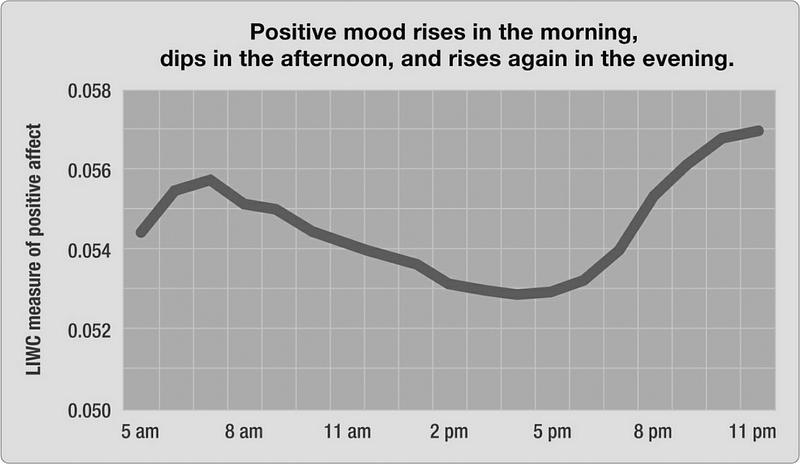 Source:
Source: 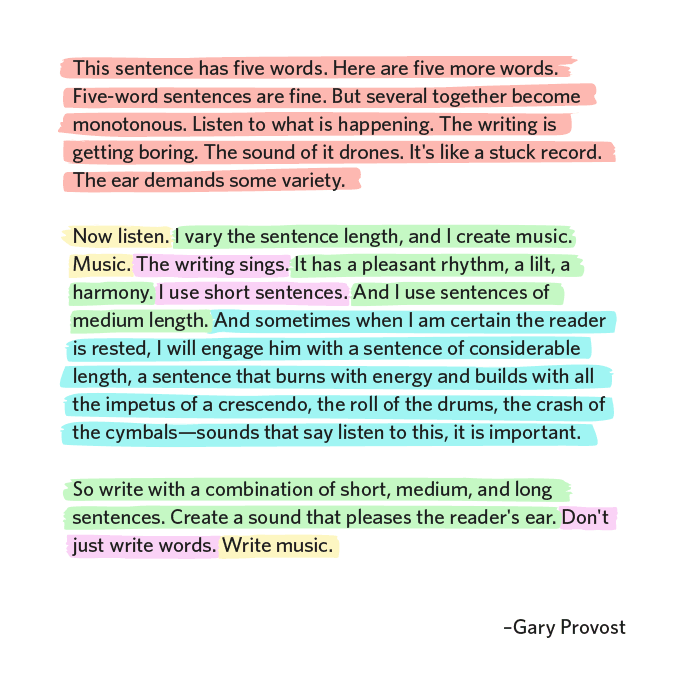 Source: HelpScout Website
Source: HelpScout Website
Leave a Reply